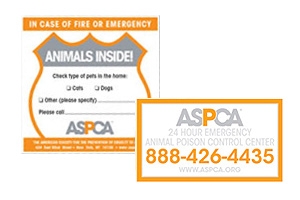Disasters, emergencies or regular care; the ASPCA offers guidance and tips on how you and your pet can be prepared for anything.
This summer they even introduced a mobile app that has all this information and more at your fingertips, available even when there is no data connectivity. The app can even help you manage important records and allow you to have vital information on hand in case of an emergency. Below are some basic tips, courtesy of the ASPCA, that will help ensure you and your pet are prepared for any scenario.
 Make sure all pets wear collars and tags with up-to-date identification
Make sure all pets wear collars and tags with up-to-date identification- Microchip your pets and register the chip. It may be their ticket home if they become lost
- Build a portable pet emergency kit with items such as medical records, water, pet food, medications and pet first aid supplies
- Affix a pet rescue sticker to your windows (Get a free one from the ASPCA here or check local pet stores)
- Have current photos of your pets on hand
- Arrange a safe haven for your pets in the event of evacuation, and never leave them behind
- Identify ahead of time where you’ll bring your pets — whether it’s a relative’s house or a pet-friendly hotel — because not all emergency facilities accept animals
- Remember: any home unsafe for people is also unsafe for pets
Here’s a list of items pet owners should include in their pet preparedness kits:
- Pet first-aid kit (Check out specialized pet specific kits here)
- 3-7 days’ worth of canned or dry food
- Disposable litter trays (aluminum roasting pans work well)
- Litter or paper toweling
- Liquid dish soap and disinfectant
- Disposable garbage bags
- Pet feeding dishes
- Extra collars or harnesses, as well as an extra leash
- Photocopies of medical records – and you can store them on the ASPCA App so the records are stored in more than one place.
- A waterproof container with a two-week supply of any medicine your pet requires (make sure to regularly replace expired food and medicines in your kit)
- At least a week’s worth of bottled water for you and your pet (store in a cool, dry place and replace every two months)
- A traveling bag, crate or sturdy carrier, ideally one for each pet
- A flashlight
- A blanket
- Recent photos of your pets (in case you are separated and need to make “Lost” posters)
- Especially for cats: A pillowcase as a crate alternative, and large bags for supplies, toys, and scoopable litter
- Especially for dogs: Extra leash, toys and chew toys, a week’s worth of cage liner
Feature photo by U.S. Geological Society used under a creative commons license

